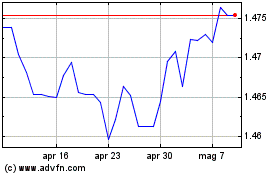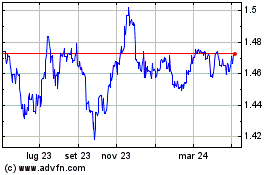Commodity Currencies Rise As Chinese Services PMI Logs Fastest Growth In 7 Months
06 Gennaio 2025 - 5:26AM
RTTF2
The commodity currencies such as Australia, the New Zealand and
the Canadian dollars strengthened against their major currencies in
the Asian session on Monday, as China's service sector grew at the
fastest pace in seven months in December underpinned by greater
business inflows.
Data from S&P Global showed that the services Purchasing
Managers' Index posted 52.2 in December, up from 51.5 in November.
The score was forecast to climb to 51.7.
The services activity extended its expansion to two years.
Moreover, activity growth accelerated the most since May.
The composite output index dropped to 51.4 in December from 52.3
in November.
In other economic news, data from S&P Global showed that the
services sector in Australia continued to expand in December, and
at a faster rate, with a services PMI score of 50.8. That's up from
50.5 in November.
According to reports, Justin Trudeau is prepared to step down as
prime minister of Canada, possibly as soon as today.
Additionally, since Canada is the biggest exporter of crude to
the U.S., rising oil prices strengthened the commodity-linked
CAD.
West Texas Intermediate (WTI) Oil trades around $73.50 per
barrel, nearing its highest level since October 2024.
Investors are also bracing for policy shifts under the Trump
administration, with stricter sanctions on Iran expected to
significantly impact global oil supply.
In the Asian trading today, the Australian dollar rose to a
2-week high of 0.9001 against the Canadian dollar, from Friday's
closing value of 0.8974. The aussie may test resistance around the
0.91 region.
Against the U.S. dollar and the yen, the aussie advanced to
1-week highs of 0.6240 and 98.30 from last week's closing quotes of
0.6212 and 97.70, respectively. If the aussie extends its uptrend,
it is likely to find resistance around 0.64 against the greenback
and 99.00 against the yen.
The aussie edged up to 1.6523 against the euro, from Friday's
closing value of 1.6583. On the upside, 1.63 is seen as the next
resistance level for the aussie.
The NZ dollar rose to a 6-day high of 0.5635 against the U.S.
dollar and a 1-week high of 88.76 against the yen, from Friday's
closing quotes of 0.5611 and 88.24, respectively. If the kiwi
extends uptrend, it is likely to find resistance around 0.58
against the greenback and 89.00 against the yen.
The kiwi advanced to a 4-day high of 1.8300 against the euro,
from last week's closing value of 1.8355. On the upside, 1.81 is
seen as the next resistance level for the kiwi.
Against the Australian dollar, the kiwi climbed to a 4-day high
of 1.1065 from a recent low of 1.1086. The kiwi may test resistance
around the 1.09 region.
The Canadian dollar rose to a 4-day high of 109.63 against the
yen, from Friday's closing value of 108.85. The next possible
upside target for the loonie is seen around the 111.00 region.
Against the euro and the U.S. dollar, the loonie edged up to
1.4844 and 1.4388 from last week's closing quotes of 1.4892 and
1.4447, respectively. If the loonie extends its uptrend, it is
likely to find resistance around 1.45 against the euro and 1.41
against the greenback.
Looking ahead, Germany CPI reports for December, Canada and U.S.
S&P Global PMI reports for December and U.S. factory orders for
November, are slated for released in the New York session.
Grafico Cross Euro vs CAD (FX:EURCAD)
Da Dic 2024 a Gen 2025

Grafico Cross Euro vs CAD (FX:EURCAD)
Da Gen 2024 a Gen 2025
